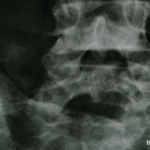Adding certolizumab pegol to background medication is better than adding a placebo for patients with active nonradiographic axial spondyloarthritis, according to a new study…
Search results for: axial spondyloarthritis

A New Treatment for Axial Spondyloarthritis?
If approved by the U.S. Food and Drug Administration (FDA), difficult-to-treat patients with axial spondyloarthritis who fail or are intolerant to standard treatment with tumor necrosis factor inhibitors (TNFi) may have a new treatment option. That new option is a high-affinity monoclonal antibody, called ixekizumab, which selectively targets an area linked to the immunopathology of…
Adalimumab May Help Maintain Remission in Non-Radiographic Axial Spondyloarthritis
NEW YORK (Reuters Health)—In patients with active non-radiographic axial spondyloarthritis (nr-axSpA) who achieved remission while taking adalimumab, researchers saw fewer flares among those who continued taking the drug than among those who stopped taking it. “The results showed that continued therapy with adalimumab was associated with a higher rate of maintenance of remission compared with…

Management of Psoriatic Arthritis, Treatment of Axial Spondyloarthritis Addressed at EULAR 2016
LONDON—Rheumatologists need to make the management of psoriatic arthritis (PsA) “a little more complex,” treating different tissues individually and doing more to help treat and prevent co-morbidities, an expert said here at the Annual Congress of the European League Against Rheumatism (EULAR) 2016. Iain McInnes, MD, PhD, director of the Research Institute for Infection, Immunity…
NSAIDs Effective for Early Axial Spondyloarthritis
NEW YORK (Reuters Health)—Nonsteroidal anti-inflammatory drugs (NSAIDs) are effective, but underused, in patients with early axial spondyloarthritis, researchers from France report. NSAIDs are the cornerstone of treatment of axial spondyloarthritis, but there is often a trade-off between prescribing doses high enough to decrease pain and other symptoms vs. keeping the doses low enough to decrease…

New Guideline: NSAIDs Effective in Treating Ankylosing Spondylitis & Nonradiographic Axial Spondyloarthritis
In February, new recommendations were released for the treatment of ankylosing spondylitis and nonradiographic axial spondyloarthritis, noting that NSAIDs may be the best initial treatment for the diseases, with TNF inhibitors as second-line therapies. The guideline was the result of a joint effort by the ACR, the Spondylitis Association of America and the Spondyloarthritis Research and Treatment Network…

Subcutaneous Golimumab in Active Non-Radiographic Axial Spondyloarthritis
Patients with non-radiographic axSpA experience reduced mobility and quality of life. In this study, researchers investigated the effect of treatment for nr-axSpA every four weeks with SQ golimumab (GLM). Seventy-one percent of patients in the GLM group achieved ASAS 20 response at Week 16, compared with 40.0% in the control group…

EULAR 2015: Emerging Concepts, Treatments for Axial Spondyloarthritis
ROME, Italy—When it comes to thinking about disease modification—a main goal in the treatment of axial spondyloarthritis (axial SpA) and other inflammatory diseases—it’s time to reconsider the concept, an expert said at EULAR 2015, the annual congress of the European League Against Rheumatism (EULAR). The traditional way of assessing disease modification, inhibiting radiographic progression, is…
Rheumatologists Make Progress Defining Spectrum of Axial Spondyloarthritis
New research clarifies terminology used for diagnosis, but questions remain around epidemiology, genetics and management of patients with axial skeletal inflammation
Neutrophilic Inflammation in Spondyloarthritis
CHICAGO—In the basic science session, Beyond NETs: Alternative Roles of Neutrophils in Spondyloarthritis, neutrophils are explored as a common pathophysiologic thread among the spondyloarthropathies. In this two-part talk, Dennis McGonagle, PhD, professor of investigative rheumatology at the Leeds Institute of Rheumatic and Musculoskeletal Medicine at St James Hospital, Leeds, England, opens by examining the role…
- « Previous Page
- 1
- 2
- 3
- 4
- 5
- …
- 20
- Next Page »